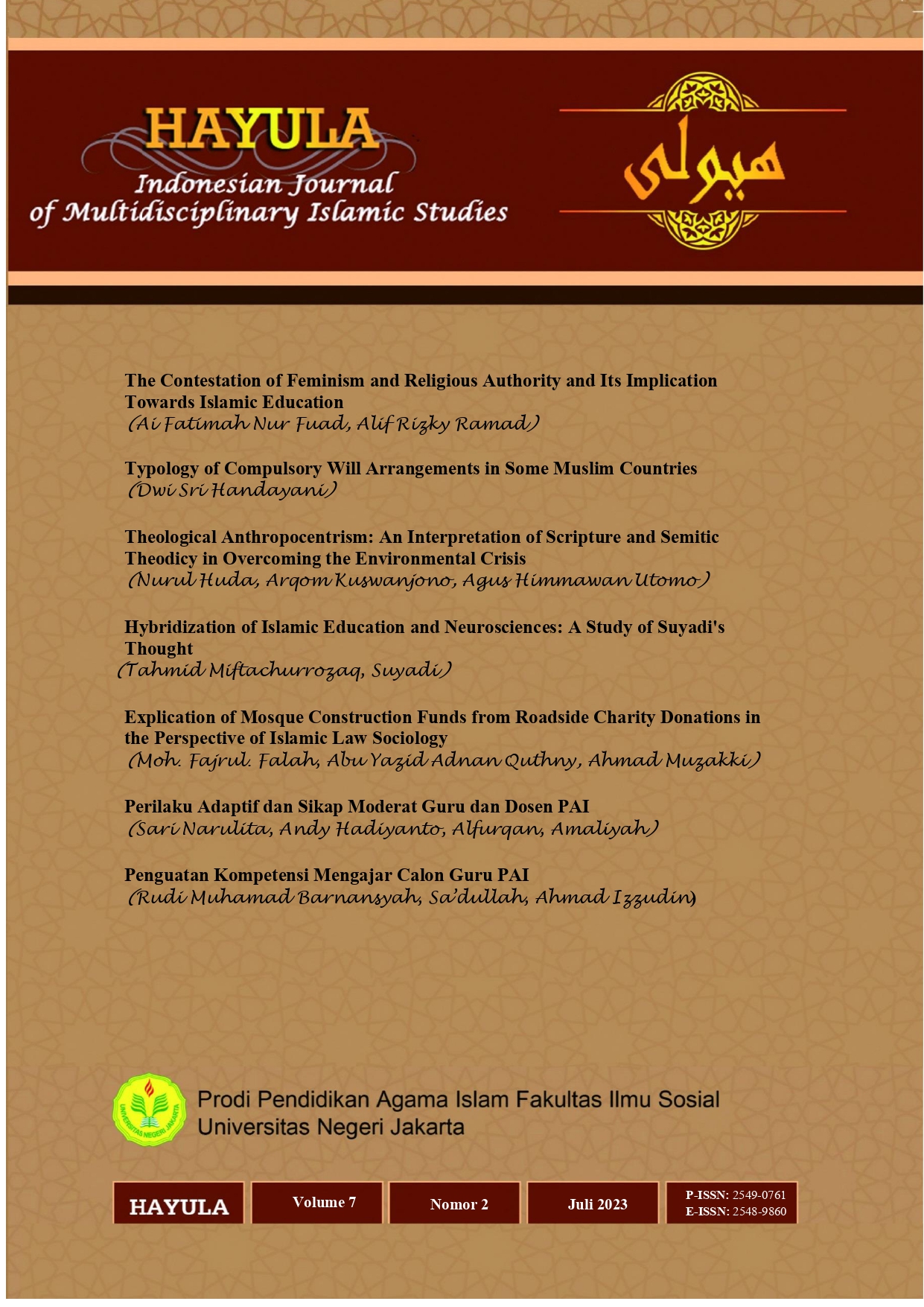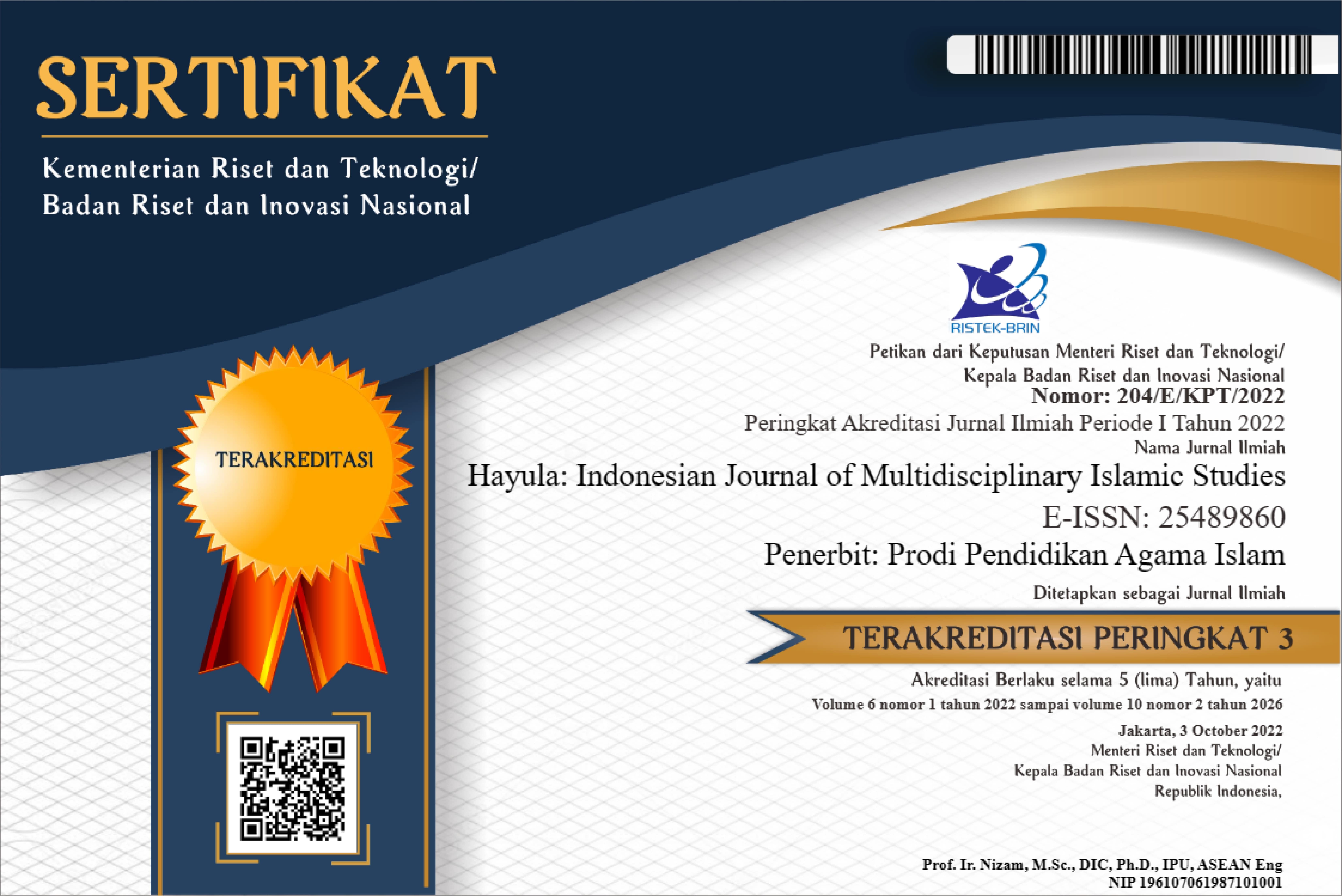The Contestation of Feminism and Religious Authority and Its Implication in Islamic Education
DOI:
https://doi.org/10.21009/hayula.007.02.01Keywords:
Feminisme, Islam, Religious Authority, Islamic Education, WomenAbstract
Feminism and religious authority are two conceptual frameworks that have been subjects of discussion in the field of Islamic education. Both concepts are an ongoing contestation due to difference of perspectives and practices within Muslim community. Feminism in one hand is a movement that advocates gender equity and criticizes the marginalization of women in society. It often questions the culture of patriarchy that limit women’s agency. On the other hand, religious authority is often described as male-dominated domain. This paper aims to elaborate how feminism challenges traditional and conservative religious authority and to what extent its implications towards Islamic education? These questions are answered through a library-based qualitative method. The finding shows that feminism challenges the dominance of male religious authority. Feminism emphasizes the need for Islamic educational institutions to implement egalitarian principles of Islam that place female and male equally and to promote women’s religious role, leadership and religious authority. This will contribute to rebuild a more egalitarian Islamic education that empower women and shape a more inclusive Muslim society.
References
Abou El Fadl, K. (2001). Speaking in God’s name: Islamic law, authority and women. Simon and Schuster.
Abugideiri, H. (2010). Revisiting the Islamic past, deconstructing male authority: The project of Islamic feminism. Religion & Literature, 42(1/2), 133–139.
Abu-Lughod, L. (1990). The romance of resistance: Tracing transformations of power through Bedouin women. American Ethnologist, 17(1), 41–55.
Adaruddin, S. (2020). Feminisme Perspektif Islam. AL-WARDAH: Jurnal Kajian Perempuan, Gender Dan Agama, 14(2), 245–253.
Adlin, A. (2016). Michel Foucault: Kuasa/Pengetahuan,(Rezim) Kebenaran, Parrhesia. Jaqfi: Jurnal Aqidah Dan Filsafat Islam, 1(1), 13–26.
Ahmed, L. (1992). Women and gender in Islam: Historical roots of a modern debate. Yale University Press.
Akmaliyah, A., & Khomisah, K. (2020). Gender Perspektif Interpretasi Teks dan Kontekstual. Marwah: Jurnal Perempuan, Agama Dan Jender, 19(1), 50–64.
Aulia, R. N. (2013). Rimpu: Budaya Dalam Dimensi Busana Bercadar Perempuan Bima. Jurnal Studi Al-Qur'an, 9(2), 94-108.Barazangi, N. H. (2004). Muslim women’s education: Between East and West. In Muslim women’s education: Between East and West. Holmes and Meier Publishing.
Barlas, A. (2001a). Muslim women and sexual oppression: Reading liberation from the Quran. Macalester International, 10(1), 15.
Barlas, A. (2001b). The Qur’an and Hermeneutics: Reading the Qur’an’s Opposition to Patriarchy. Journal of Qur’anic Studies, 3(2), 15–38.
Darajat, Z. (2017). Muhammadiyah dan NU: Penjaga Moderatisme Islam di Indonesia. Hayula: Indonesian Journal of Multidisciplinary Islamic Studies, 1(1), 79–94.
Derrida, J. (2016). Of grammatology. Jhu Press.
Fletcher, C. D. (2005). The methodology of Abdolkarim Soroush: A preliminary study. Islamic Studies, 44(4), 527–552.
Foucault, M. (2019). Power: the essential works of Michel Foucault 1954-1984. Penguin UK.
Fuad, A. F. N. (2019). Modernity and The Islamists Notion of Active Da’wa. Afkaruna: Indonesian Interdisciplinary Journal of Islamic Studies, 15(2), 187–202. https://doi.org/10.18196/aiijis.2019.0102.187-202
Fuad, A. F. N. (2021). Female Religious Authority among Tarbiyah Communities in Contemporary Indonesia. Archipel. Études Interdisciplinaires Sur Le Monde Insulindien, 102, 187–207. https://doi.org/10.4000/archipel.2657
Haramain, M. (2019). Dakwah Pemberdayaan Perempuan: Telaah Pemikiran Qasim Amin Tentang Kesetaraan Gender. Zawiyah: Jurnal Pemikiran Islam, 5(2), 218–235.
Haris, M. (2015). Kepemimpinan Perempuan dalam Islam. ANALISIS: Jurnal Studi Keislaman, 15(1), 81–98.
Himmah, D. N. A., & Yaqien, N. (2017). Kepemimpinan Perempuan Dalam Perspektif Islam. J-MPI (Jurnal Manajemen Pendidikan Islam), 2(2), 142–147.
Hoodfar, H. (1996). Bargaining with fundamentalism: Women and the politics of population control in Iran. Reproductive Health Matters, 4(8), 30–40.
Ilyas, Y. (2002). Problem Kepemimpinan Perempuan Dalam Islam : Tinjauan Tafsir Al-Qur’an. Tarjih: Jurnal Tarjih Dan Pengembangan Pemikiran Islam, 3(1), 63–73.
Irawaty, I., & Darojat, Z. (2019). Kedudukan dan Peran Perempuan dalam Perspektif Islam dan Adat Minangkabau. Hayula: Indonesian Journal of Multidisciplinary Islamic Studies, 3(1), 59–76.
Jaya, D. (2019). Gender dan Feminisme: Sebuah Kajian dari Perspektif Ajaran Islam. Jurnal At-Tatbiq: Jurnal Ahwal Al-Syakhsiyyah, 4(01), 19–40.
Jaya, M. (2020). Penafsiran Surat An-Nisa’ Ayat 34 Tentang Kepemimpinan dalam Al-Quran. At-Tanzir: Jurnal Ilmiah Prodi Komunikasi Penyiaran Islam, 241–268.
Keddie, A. (2018). Disrupting (gendered) Islamophobia: The practice of feminist ijtihad to support the agency of young Muslim women. Journal of Gender Studies, 27(5), 522–533.
Khoer, F. I., Gustiawati, S., & Yono, Y. (2022). Kepemimpinan Perempuan Dalam Perspektif Hukum Islam. As-Syar’i: Jurnal Bimbingan & Konseling Keluarga, 4(1), 42–49.
Kholis, M. N. (2015). Konsep Kepala Keluarga Antara Laki-Laki Dan Perempuan Dalam Surat An Nisa (4) Ayat 34. Istinbath: Jurnal Hukum, 12(2), 274–290.
Leschi, D. (1996). F. Muel-Dreyfus, Vichy et l’éternel féminin. Politix. Revue Des Sciences Sociales Du Politique, 9(34), 228–231.
Lubis, S. A. S. (2022). Renewal of Ijtihad in the Modern Era: Historical Background and Current Developments. International Journal Reglement & Society (IJRS), 3(2), 107–115.
Mahfud, C. (2019). Understanding Education of Authoritative Islamic Law Perspective Khaled Abou el Fadl. MODELING: Jurnal Program Studi PGMI, 6(1), 1–12.
Mahmood, S. (2001). Feminist theory, embodiment, and the docile agent: Some reflections on the Egyptian Islamic revival. Cultural Anthropology, 16(2), 202–236.
Mahmudah, N. (2016). Perempuan Dalam Relasi Kuasa Tafsir Al Qur’an: Telaah Atas Corak Tafsir Ummu Salamah RA. PALASTREN: Jurnal Studi Gender, 6(2), 421–440.
Margot, B. (2009). Feminism in Islam: Secular and religious convergences. Oneworld.
Mas’udah Al Mas’udah, A. (2018). Agama dan Pemikiran Keagamaan (Membedah Teori Abdulkarim Soroush Tentang Qabdh Wa Bast). Jurnal Al Himayah, 2(1), 1–16.
Masri, D. (2021). Keutamaan pria sebagai pemimpin. ANSIRU PAI: Pengembangan Profesi Guru Pendidikan Agama Islam, 5(2), 156–167.
Mayer, A. E. (2016). Islamic Law and Human Rights: Conundrums and Equivocations. In Religion And Human Rights (pp. 177–198). Routledge.
Mir-Hosseini, Z. (2003). Muslim Women's quest for equality: between Islamic Islamic Law and feminism. Critical Inquiry, 32 (4), 629-645.
Moghadam, V. M. (2001). Feminism and Islamic fundamentalism: A secularist approach. Journal of Women’s History, 13(1), 42–45.
Moghadam, V. M. (2002). Islamic feminism and its discontents: Toward a resolution of the debate. Signs: Journal of Women in Culture and Society, 27(4), 1135–1171.
Moghissi, H. (1999). Feminism and Islamic fundamentalism: The limits of postmodern analysis. Zed books.
Narulita, S. (2015). Psikologi Islam Kontemporer. Jurnal Studi Al-Qur'an, 11(1), 55-69.
Patros, A., & Anggelia, C. (2021). Polemik Desakan Pengesahan RUU PKS: Suatu Tinjauan Sistem Hukum Nasional dan Perspektif Hak Asasi Manusia. Jurnal Komunikasi Hukum (JKH), 7(2), 628–640.
Pratama, R. A. (2021). Pemikiran Foucault dan Baron: Kekuasaan dan Pengetahuan dalam Pendidikan dan Bahasa. Jurnal Filsafat Indonesia, 4(1), 33–43.
Putry, R. (2015). Kepemimpinan Perempuan dalam Perspektif Islam. Jurnal MUDARRISUNA: Media Kajian Pendidikan Agama Islam, 5(2), 231–260.
Rahmat, A. (2021). Abdulkarim Soroush dan Evolusi Pemahaman Agama: Sebuah Asumsi Dasar dalam Ijtihad. IJTIHAD, 37(2), 91–100.
Rochefort, F. (2000). Féminisme et protestantisme au xix e siècle, premières rencontres 1830-1900. Bulletin de La Société de l’Histoire Du Protestantisme Français (1903-), 69–89.
Ross, S. A. (2001). Féminisme et théologie. Raisons Politiques, 4, 133–146.
Rusydiana, N. R. U., & Azami, H. T. (2021). Interpretation QS. an-Nisa’: 34 Perspectives of Amina Wadud Muhsin and The Implication of Her Thinking In Indonesia. Jurnal Ushuluddin, 29(1), 87–100.
Saʻdāwī, N. (1997). The Hidden Face of Eve: Women in the Arab World. Zed books.
Sahin, A. (2018). Critical issues in Islamic education studies: Rethinking Islamic and Western liberal secular values of education. Religions, 9(11), 335.
Said, M., Putri, M. A., Trirahayu, D., & Ismail, A. (2021). An Instrument for Assessing the Performance of University Research with a Gesi-Perspective. Advances in Social Sciences Research Journal, 8(1).
Seedat, F. (2016). Beyond the Text: Between Islam and Feminism. Journal of Feminist Studies in Religion, 32(2), 138–142.
Sholihah, F. (2020). Pengaruh Sosiologi Dalam Fiqh Kepemimpinan Wanita. Jurnal Hadratul Madaniyah, 7(2), 31–41.
Sofyan, M. (2015). Konsep Hermeneutika Otoritatif Khaled Abou El-Fadl. KALAM, 9(2), 373–392.
Soroush, A. (2000). Reason, Freedom, & Democracy in Islam: Essential Writings of ʻAbdolkarim Soroush. Oxford University Press.
Sufyan, A., & Irwan, I. (2022). Agama vs Ilmu Agama: Sebuah Pembacaan Teori Epistemologis Abdul Karim Soroush. TAJDID: Jurnal Pemikiran Keislaman Dan Kemanusiaan, 6(1), 14–21.
Suriansyah, E. (2017). Merombak Struktur, Membentuk Kultur (Studi Pemikiran Siti Musdah Mulia). Jurnal Studi Agama Dan Masyarakat, 13(2), 293–317.
Suwastini, N. K. A. (2019). Perkembangan feminisme Barat dari abad kedelapan belas hingga post feminisme: Sebuah Tinjauan Teoretis. Jurnal Ilmu Sosial Dan Humaniora, 2(1).
Syafiuddin, A. (2018). Pengaruh Kekuasaan Atas Pengetahuan (Memahami Teori Relasi Kuasa Michel Foucault). Refleksi Jurnal Filsafat Dan Pemikiran Islam, 18(2), 141–155.
Tohidi, N. (2003). Islamic feminism: Perils and promises. Middle Eastern Women on the Move, 135–146.
Wadud, A. (1999). Qur’an and woman: Rereading the sacred text from a woman’s perspective. Oxford University Press, USA.
Wadud, A. (2013). Inside the gender Jihad: women’s reform in Islam. Simon and Schuster.
Downloads
Published
How to Cite
Issue
Section
License
Authors who publish with this Journal agree to the following terms:
- Author retain copyright and grant the journal right of first publication with the work simultaneously licensed under a creative commons attribution licensethat allow others to share the work within an acknowledgement of the work’s authorship and initial publication of this journal.
- Authors are able to enter into separate, additional contractual arrangementfor the non-exclusive distribution of the journal’s published version of the work (e.g. acknowledgement of its initial publication in this journal).
- Authors are permitted and encouraged to post their work online(e.g. in institutional repositories or on their websites) prior to and during the submission process, as it can lead to productive exchanges, as well as earlier and greater citation of published works.
Users/public use of this website will be licensed to CC BY







